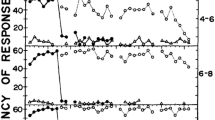Abstract
The idea that an individual's behavior is a function of its ‘utility’ or ‘Value’ represents a very common and fundamental assumption in the study of human conduct. In this paper it will be attempted to determine the nature of this function more precisely. Adopting a probabilistic conception of human action, it appears that an exponential function perfectly satisfies the empirical as well as formal conditions which it seems necessary to impose upon it initially. Empirical research into behavioral change lends additional support to the function thus constructed.
Similar content being viewed by others
References
Abelson, Robert P. et al. (eds.): 1968, Theories of Cognitive Consistency: a Sourcebook, Rand McNally, Chicago.
Becker, G. M., De Groot, M. H., andMarschak, J.: 1963, ‘Probabilities of choices among very similar objects’, Behavioral Science 8, 306–311.
Berelson, Bernard R., Lazarsfeld, Paul F., and McPhee, William: 1954, Voting: A Study of Opinion Formation in a Presidential Campaign, University of Chicago Press, Chicago and London.
Berelson, Bernard and Steiner, Gary A: 1967, Human Behavior: Shorter Edition, Harcourt, Brad and World, New York.
Berg, Irwin A. and Bass, Bernard M. (eds.): 1961, Conformity and Deviation, Harper and Bros., New York.
Berger, Joseph, Zelditch, Morris Jr., and Anderson, Bo (eds.): 1972, Sociological Theories in Progress, Vol. II, Houghton Mifflin, Boston.
Brehm, Jack W. and Cohen, Arthur R.: 1962, Explorations in Cognitive Dissonance, John Wiley, New York.
Buchanan, James M.: 1969, Cost and Choice an Inquiry in Economic Theory, Markham, Chicago.
Buck, Ross: 1976, Human Motivation and Emotion, John Wiley, New York.
Camilleri, Santo F., Berger, Joseph and Conner, Thomas L.: 1972, ‘A formal theory of decision making’, in Berger (1972), pp. 21–37.
Chipman, John S. et al. (eds.): 1971, Preference, Utility and Demand: a Minnesota Symposium, Harcourt-Brace-Jovanovich, New York.
Chipman, John S. and Moore, James C.: 1977, ‘Continuity and uniqueness in revealed preference’, Journal of Mathematical Economics 4, 139–162.
Cohen, Arthur R.: 1964, Attitude Change and Social Influence, Basic Books, New York and London.
Coombs, Clyde H. and Huang, Lily C.: 1976, ‘Tests of the betweenness property of expected utility’, Journal of Mathematical Psychology 13, 323–337.
Corbin, R. and Marley, A. A. J.: 1974, ‘Random utility models with equality: an apparent, but not actual, generalization of random utility models’, Journal of Mathematical Psychology 11, 274–293.
De Vree, Johan K.: 1976, ‘Theory of human behavior and of the political process’, Acta Politica XI, No. 4, 489–524.
De Vree, Johan K.: 1980, ‘The roots of behavior: sketch of a theory of human learning’, paper presented at the Third Annual Scientific Meeting of the International Society of Political Psychology, Boston, June 1980.
De Vree, Johan K.: 1982, Foundations of Social and Political Processes: the Dynamics of Human Behavior, Politics, and Society, Prime Press, P.O. Box 349, 3720 AH, Bilthoven, The Netherlands.
Edwards, Ward and Tversky, Amos (eds.): 1967, Decision-making Selected Readings, Penguin Books.
Ellsburg, D.: 1968, ‘Classic and current notions of “measurable utility”’, in Page (1968), pp. 269–296.
Fellner, William: 1965, Probability and Profit: a Theory of Economic Behavior Along Bayesian Lines, Irwin, Homewood (ILI).
Fishburn, Peter C.: 1976, ‘Representable choice functions’, Econometrica 44, 1033–1043.
Fishburn, Peter C.: 1977, ‘Models of individual preference and choice’, Synthese 36, 287–314.
Fishburn, Peter C.: 1978, ‘Choice probabilities and choice functions’, Journal of Mathematical Psychology 18, 205–219.
Halldin, Carl: 1974, ‘The choice axiom, revealed preference, and the theory of demand’, Theory and Decision 5, 139–160.
Harsanyi, John: 1977, Rational Behavior and Bargaining in Games and Social Situations, Cambridge U.P., Cambridge.
Insko, Chester A.: 1967, Theories of Attitude Change, Appleton-Century, Crofts, New York.
Irle, Martin (ed.): 1978, Attraktivität von Entscheidungsalternative und Urtelssicherheit, Huber, Berlin.
Jervis, Robert: 1976, Perception and Misperception in International Politics, Princeton U.P., Princeton, N.Y.
Kaufmann-Mall, Klaus: 1978, Kognitiv-hedonistische Theorie menschlichen Verhaltens, Huber, Bern.
Krantz, David H. et al.: 1971, Foundations of Measurement, Vol. I, Additive and Polynomial, Representations, Academic Press, New York and London.
Lee, Wayne: 1971, Decision Theory and Human Behavior, John Wiley, New York.
Leinfellner, Werner: 1965, Struktur und Aufbau wissenschaftlicher Theorien: eine wissenschafts-theoretisch-philosophische Untersuchung, Physica Verlag, Wien-Würzburg.
Luce, R. Duncan, Bush, Robert R., and Galanter, Eugene (eds.): 1963–65a; Handbook of Mathematical Psychology, Vols. 1, 2, 3, Wiley, New York.
Luce, R. Duncan, and Suppes, Patrick: 1963b, ‘Preferences Utility, and subjective probability’, in Luce, Bush, Galanter, 1963–65a, Vol. 3, pp. 249–410.
Narens, Louis: 1976, ‘Utility-uncertainty trade-off structures’, Journal of Mathematical Psychology 13, 296–322.
Von Neumann, John and Morgenstern, Oskar: 1964, Theory of Games and Economic Behavior, 3rd ed., Wiley, New York.
Packard, Dennis J.: 1975, ‘A preference logic minimally complete for expected utility maximization’, Journal of Philosophical Logic 4, 223–235.
Packard, Dennis J.: 1979, ‘Preference relations’, Journal of Mathematical Psychology 19, 295–306.
Rachlin, Howard: 1976, Behavior and Learning, Freeman, San Francisco.
Rescher, Nicholas: 1969, Introduction to Value Theory, Prentice-Hall, Englewood-Cliffs, (N.Y.).
Schwartz, Thomas: 1976, ‘Choice functions, “rationality” conditions, and variations on the weak axiom of revealed preference’, Journal of Economic Theory 13, 414–427.
Simon, Herbert A.: 1957, Models of Man: Social and Rational, Mathematical Essay, on Rational Human Behavior in a Social Setting, John Wiley, N.Y. and London.
Stegmüller, Wolfgang: 1969–1970, Wissenschaftliche Erklärung und Begründung, Bd. I von Probleme und Resultate der Wissenschaftstheorie und Analytischen Philosophie, Springer, Berlin, 1969;Bd. II Theorie und Erfahrung, 1970 (Probleme ... II).
Tversky, A.: 1972a, ‘Choice by elimination’, Journal of Mathematical Psychology 9, 341–367.
Tversky, A.: 1972b, ‘Elimination by aspects: a theory of choice’, Psychological Review 79, 281–299.
Tullock, Gordon: 1964, ‘The irrationality of intransitivity’, Oxford Economic Papers - New Series, Vol. 16, No. 3, 401–406.
Zimbardo, Philip and Ebbesen, Ebbe B.: 1970, Influencing Attitudes and Changing Behavior: a Basic Introduction to Relevant Methodology, Theory, and Applications, Addison-Wesley, Reading (Mass.).
Author information
Authors and Affiliations
Rights and permissions
About this article
Cite this article
De Vree, J.K. The behavioral function: An inquiry into the relation between behavior and utility. Theor Decis 15, 231–245 (1983). https://doi.org/10.1007/BF00125670
Issue Date:
DOI: https://doi.org/10.1007/BF00125670




